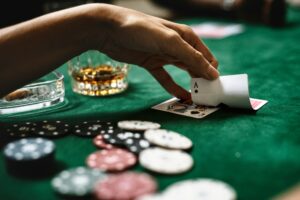Psychology of Poker: Developing the Mental Fortitude of a Champion


Poker is often seen as a battle of wits, where players compete against one another using strategy, psychology, and an understanding of probability. While mastering the game’s mechanics is essential, it’s the psychological aspect of poker that truly separates the best from the rest. Mental strength is vital for poker players who aspire to reach the highest levels of competition. It enables them to stay focused, manage emotions, and consistently make optimal decisions under pressure.
A poker champion’s success doesn’t stem only from their ability to play the odds; it arises from their ability to control their thoughts and emotions. Psychological endurance allows a player to stay calm in stressful situations, recover from bad beats, and avoid succumbing to the many pitfalls that come with long, intense poker sessions. It’s the unseen aspect of the game that truly defines a player’s success.
Confidence and Self-Belief: The Foundation of Success
Confidence is an essential element in a poker player’s psychological toolbox. A confident player approaches the game with belief in their decisions, their strategies, and their ability to outsmart opponents. This self-belief allows players to make bold moves when necessary without fear of failure or hesitation.
However, poker confidence isn’t about being reckless or overestimating one’s abilities—it’s about trusting the process. The most successful players understand that making mistakes is an inherent part of the game, yet they still trust their skills and intuition. They also recognize the importance of self-assurance during moments of adversity. When faced with a tough hand or difficult situation, confident players can stay composed, avoid panicking, and make the best decision for their long-term success.
Controlling Emotions: The Battle Against Tilt
Tilt is one of the most significant psychological challenges in poker. It refers to a state of emotional frustration, anger, or irrationality that leads to poor decision-making. Tilt can occur after a bad beat, losing streak, or unfavorable situation, and it often results in impulsive decisions that deviate from a player’s strategy.
To avoid tilt, players must learn techniques for emotional regulation and self-control. Maintaining composure is crucial when the game isn’t going in one’s favor. Professional poker players often employ strategies such as deep breathing, mindfulness, and visualization to manage their emotions effectively. By doing so, they ensure that their focus stays on the game and not on external frustrations. Mastering emotional control enables players to make rational decisions and stay focused, even in moments of intense stress.
Patience and Focus: The Key to Long-Term Success
Poker is a game of patience, requiring players to wait for the right opportunities to strike. Pro players know how to exercise patience, avoid impulsive decisions, and let their hands unfold according to their strategy. They understand that poker is a marathon, not a sprint and that the key to long-term success lies in maintaining focus and avoiding distractions.
Patience also involves knowing when to fold and when to play aggressively. Top players don’t rush to make moves just because they’re itching for action—they remain calm and wait for advantageous situations. Staying focused throughout long sessions allows them to analyze every aspect of the game and maintain a steady mindset. This discipline is what enables players to thrive, even after hours of play, without losing focus or becoming fatigued.
Embracing a Growth Mindset for Continuous Improvement
Poker is a constantly evolving game, and players who don’t continue to learn and grow will fall behind. Embracing a growth mindset is essential for long-term success. A growth mindset means being open to learning from both wins and losses, using each experience as a stepping stone for improvement.
For poker players, adopting this mindset involves regularly reviewing past performances, analyzing mistakes, and refining strategies. Top players view every hand as an opportunity to improve, whether they win or lose. They seek feedback from other players, study poker books, and watch professional games to enhance their skills continually. By adopting a growth mindset, poker players stay competitive and maintain the mental agility required to succeed in a highly competitive environment.
Visualization Techniques: Preparing for Success
Visualization is a powerful psychological tool that can help poker players prepare for the mental challenges of the game. By visualizing themselves performing well in various scenarios, players can reinforce their confidence, reduce anxiety, and enhance their decision-making process during actual games.
Top professionals often spend time visualizing the various strategies they would employ in different situations. Whether it’s imagining themselves staying calm after a bad beat or visualizing successful bluffing techniques, this mental preparation strengthens their ability to execute their plan when it counts. Visualization helps players stay focused and determined, especially when the stakes are high.
The Psychological Edge: Winning the Mental Battle
Poker is as much about psychology as it is about cards. Winning the mental battle is often what gives professional players their edge over opponents. Understanding the psychology of poker means mastering one’s mind while also understanding the psychological tendencies of others at the table.
Pro players use psychological techniques to observe their opponents and adjust their strategies accordingly. Whether it’s noticing subtle tells, reading betting patterns, or gauging emotional responses, players can use this knowledge to predict their opponents’ actions and make more informed decisions. This psychological edge plays a pivotal role in determining a player’s success.
Conclusion: Strengthening the Mental Game for Poker Excellence
To become a successful poker player, developing psychological resilience is just as important as mastering the game’s mechanics. Confidence, emotional control, focus, patience, and a growth mindset all contribute to a player’s mental toughness and overall success at the table. By understanding and honing the psychological elements of poker, players can unlock their full potential and consistently perform at a high level.
Poker is a mental sport as much as it is a game of strategy. The ability to stay composed under pressure, learn from every experience, and remain focused on the long-term strategy are essential for excelling in the game. By strengthening their mental fortitude, players can enhance their chances of success and cultivate the champion mindset necessary to thrive in the world of poker.

